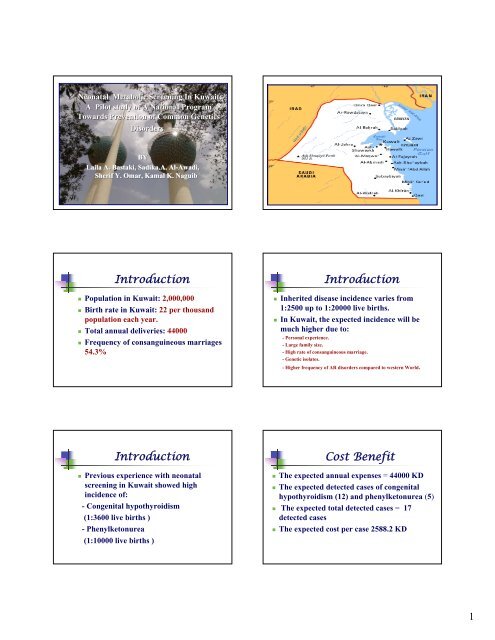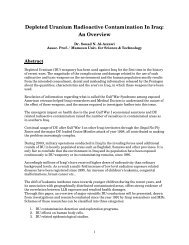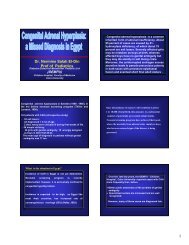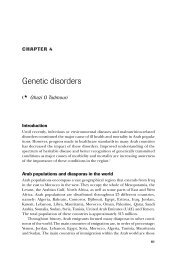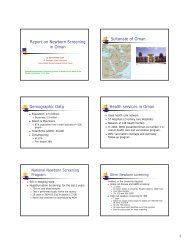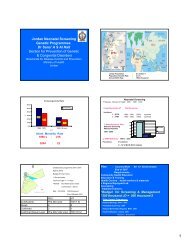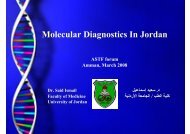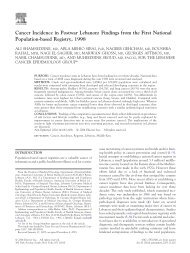Neonatal Metabolic Screening In Kuwait - Jeans4genes.org
Neonatal Metabolic Screening In Kuwait - Jeans4genes.org
Neonatal Metabolic Screening In Kuwait - Jeans4genes.org
You also want an ePaper? Increase the reach of your titles
YUMPU automatically turns print PDFs into web optimized ePapers that Google loves.
<strong>Neonatal</strong> <strong>Metabolic</strong> <strong>Screening</strong> <strong>In</strong> <strong>Kuwait</strong>:<br />
A Pilot study of A National Program<br />
Towards Prevention of Common Genetics<br />
Disorders<br />
BY<br />
Laila A. Bastaki, Sadika.A. . Al-Awadi, Awadi,<br />
Sherif Y. Omar, Kamal K. Naguib<br />
<strong>In</strong>troduction<br />
• Population in <strong>Kuwait</strong>: 2,000,000<br />
• Birth rate in <strong>Kuwait</strong>: 22 per thousand<br />
population each year.<br />
• Total annual deliveries: 44000<br />
• Frequency of consanguineous marriages<br />
54.3%<br />
<strong>In</strong>troduction<br />
• <strong>In</strong>herited disease incidence varies from<br />
1:2500 up to 1:20000 live births.<br />
• <strong>In</strong> <strong>Kuwait</strong>, the expected incidence will be<br />
much higher due to:<br />
- Personal experience.<br />
- Large family size.<br />
- High rate of consanguineous marriage.<br />
- Genetic isolates.<br />
- Higher frequency of AR disorders compared to western World.<br />
<strong>In</strong>troduction<br />
• Previous experience with neonatal<br />
screening in <strong>Kuwait</strong> showed high<br />
incidence of:<br />
- Congenital hypothyroidism<br />
(1:3600 live births )<br />
- Phenylketonurea<br />
(1:10000 live births )<br />
Cost Benefit<br />
• The expected annual expenses = 44000 KD<br />
• The expected detected cases of congenital<br />
hypothyroidism (12) and phenylketonurea (5)<br />
• The expected total detected cases = 17<br />
detected cases<br />
• The expected cost per case 2588.2 KD<br />
1
Material and Methods<br />
RESULTS<br />
• Newborn screening occurs in 4 governmental hospitals<br />
(Maternity, Farwaniya, Adan & Jahra hospitals).<br />
• Heelstick samples are collected at 3-7 days, sent to the lab<br />
within 24 hrs and reported within 3-5 days. Protocol is<br />
Delfia for CH and PKU.<br />
• <strong>Screening</strong> for other inborn errors of metabolism including<br />
amino acids, <strong>org</strong>anic acids, fatty acids, carnitine and<br />
acylcarnitine disorders was introduced using tandem mass<br />
spectrometry in cooperation with Faculty of Pharmacy<br />
<strong>Kuwait</strong> University.<br />
• Total number of newborn screened during period from 1/1/2005<br />
to 31/12/2005 were 3029 cases.<br />
• Total No. of abnormal screening results during this period were<br />
39 cases – 20 CH, 11 HPA, 8 other<br />
- CH (20) - VLCHAD (1)<br />
- Hyperphenylalaninemia (11) - pyruvate carboxylase def (1)<br />
- Tyrosinemia (2) - Non-ketotic hyperglycinemia (1)<br />
- LCHAD (2) - Methylmalonic academia (1)<br />
Discussion<br />
• The incidence of CH exceeds the expected figure by three-fold<br />
(8:10,000 vs. 3:10,000)<br />
• The incidence of HPA exceeds the expected figure by four-fold<br />
(3.8/10,000).<br />
• This could be due to:<br />
• False positive results.<br />
• Transient conditions<br />
• Early collection of the samples.<br />
• Frequent heterozygous carriers.<br />
• Frequent consanguineous marriages.<br />
• Unexplained situation.<br />
• Actual figures.<br />
Limitations<br />
• Not all the newborn were subjected to newborn<br />
screening (screening only occurred in 4 governmental<br />
hospitals and only to newborns in SCU units in these hospitals.<br />
• Problems with sample collection and handling:<br />
- Time of specimen collection<br />
- <strong>In</strong>sufficient blood sampling & poorly saturated filter paper<br />
- Layering of successive drops of blood in the collection circle<br />
- <strong>In</strong>complete information on the specimen card.<br />
• Problems with recall and follow up of cases<br />
Recommendations<br />
• Establish a national NBS program.<br />
• Develop a screening protocol for all parts of the e screening<br />
system:<br />
• Create a health education campaign<br />
• Train nurses in proper specimen collection<br />
• Train additional laboratory staff and develop quality assurance<br />
• Establish better communicatoin links between the screening staff and followup<br />
physicians<br />
• Improve management of affected infants<br />
• Systematically evaluate all phases of the program (pre-<br />
analytic, analytic and post-analytic) including systematic<br />
evaluation of program data<br />
• Consider tandem mass spectrometry to widen the scope of the<br />
program<br />
• Consider adding other common metabolic abnormalities<br />
2


